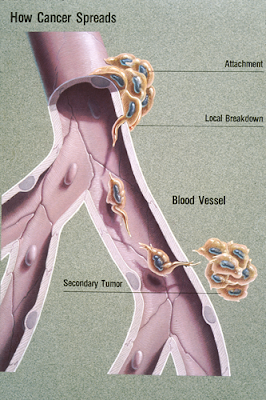Specific cancers may have different preferences, but in general the characteristics of cancer growth and spread are:
- Initiation: the transformation process of a normal cell into a cancer cell, from the first mutation until it escapes the body's defense mechanism.
- Proliferation: the process in which the rate of cell growth of the cancer cells overcome the rate of cell death. Hormones and growth factors plays important role in affecting the rate of growth of certain cancers. Even though cancer cells are dubbed immortal, they do die because the body's immune system is constantly at work and because they grow so fast, from lack of nutrients. It is believed that the cancer cells achieve their proliferation through the initiation of stem cells which are normally abundant in actively growing tissues, such as in tissue repair.
- Invasion: the process in which the cancer cells overcome the natural boundaries of different types of tissues in our body. Invasion is one of the hallmark characteristics of a malignant tumor. Normally different types of tissues have very well defined borders. You won’t find skin cells growing in deep muscle, or liver cells growing in the stomach.
- Angiogenesis: the formation of new blood vessels to provide nutrients for the growing cancer cells. Tumors could only reach a certain size before they would exhaust themselves of nutrients if it were not for angiogenesis. In other words, this is the process where a cancer steals the body's resources to feed itself.
- Metastases: is the ability of cancer cells to spread to different parts of the body via the bloodstream or the lymphatic system. Metastases is another hallmark of malignant tumors.
Every stage of development mentioned above can be interfered by different types of cancer treatment such as radiation or chemotherapy. Cancers that are growing rapidly and prone to metastases are more likely to be affected by these treatments compared to slow growing cancers which may yield better result with surgery.
